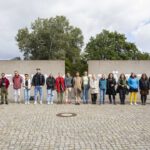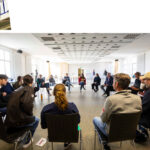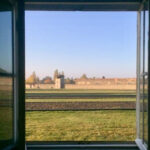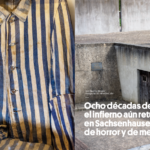Launched in 2021, the pilot project “Voices of the Next Generations” brings together descendants of prisoners from the former concentration camp of Sachsenhausen (Germany). Its objective: To highlight new perspectives on remembrance, while the last direct witnesses of the Second World War are dying out one after the other.
Note from the contributor:
This article was written a few months after the first autumn seminar in 2021. It was originally meant as an entry for a writing competition for young journalists in France, „Reporters of Hope“. The article was shortlisted, but didn’t win any prize. Ahead of the second seminar in the fall of 2022, I thought it would be a good idea to translate it and publish it on the website.

This past that does not pass
The future of remembrance is becoming a more and more pressing issue for the Sachsenhausen memorial near Berlin considering the historical turning point the passing away of the last survivors of the concentration camps represents.
“The memorial is currently at a crossroads, as survivors have always been very involved in its development historically speaking. But this generation is disappearing, while millions of descendants are still personally affected by the traumatic experience of persecution under Nazi Germany,“
stresses Axel Drecoll, director of the Brandenburg Memorials Foundation that is in charge of the preservation of the Sachsenhausen site.
In this context, the commitment of the grandchildren and great-grandchildren of the survivors is one of the keys identified by the memorial to rethink remembrance. Indeed, the perspective of younger generations has long been lacking, even though they have often supported the work of survivors associations. The idea of the symposium „Next generations in dialogue, the future of remembrance“ was born out of this realization, and made possible by the financial support of the Commissioner for Culture and the Media of the German Federal Government.
Due to covid, the first exchanges took place by videoconference during the spring of 2021, on the occasion of the anniversary of the liberation of the camp. The participants came from all over Europe, and had the opportunity to get to know each other, share their family history, but also to reflect upon the challenges remembrance faces in their respective countries ahead of a future face-to-face seminar.
Eventually, this face-to-face meeting took place during the fall of 2021 on the very spot where their ancestors had been imprisoned decades earlier. A total of 200,000 people were detained between 1936 and 1945 in what was then presented as „the most beautiful concentration camp in Germany“.
For five days, the participants were able to visit the site’s key places, meet various experts to deepen their knowledge of remembrance in post-war Germany, but also to develop their own reflection on how to promote remembrance in the era of the right to be forgotten. A very emotional and unforgettable experience, since some of them had never been to Sachsenhausen before.
“It is very strange to feel that you are in two different places at the same time, floating between the past and the present. In a different reality, this place could be a nice park, where people would have picnics and hang out with their friends”
says Danielle, a participant from Tallinn in Estonia.
Finding your voice to break the silence
While the perspective of the survivors has been widely documented, it is much less the case for the perspective of their descendants, the members of the third and fourth generation in particular. Almost eighty years after the end of the Second World War, there would be a lot to say about these young people who remain haunted by a conflict they did not experience personally.
“Survivors passed on their unprocessed trauma in different ways, so that their children reactivated the family history, and thus transferred their own trauma to the third generation,”
explains Professor Iris Wachsmuth, whose research in social pedagogy focuses on the transmission of family history and its influence on the civic engagement of younger generations.
This is exactly where all the interest of the project „Next generations in dialogue, the future of remembrance“ lies: To create a collective united by the fact that all these young people are the living memory of the victims, as suggests the video they made during their fall seminar, in which they explain why they came to the memorial and what this place means to them.
As a matter of fact, testifying against forgetting is part of a three-fold process for them. First of all, they want to tell the story of their grandparents; moreover, they can shed new light on European history through a younger perspective; finally, they are committed to preserving future generations from the profound trauma of war.
“We could present our project in two different ways: On the one hand, there is an individual dimension, since we want to share our family history; on the other, there is a collective, more political dimension, because we want to make our voices heard in the face of the rise of the far right and populism everywhere in Europe“
explains Viktor, one of the few German participants.
In order to reach these goals, they decided to create a dedicated website, voices-of-the-next-generations.org, which went online on April 27th 2022. Developed in partnership with the Sachsenhausen memorial, it is an open project where all contributions to document the voice of future generations are welcome.
Ultimately, the objective of this website is to become a platform that brings together family stories, but also shares the views of the youngest generations on memory in order to open up a broader reflection on the importance of remembrance and commemoration today.
„Since we are the living memorial of the survivors, we must continue to bring memory to life and share it in a universal way through our different points of view in order to make it accessible to all“
suggests Elias, who came from London in Great Britain.
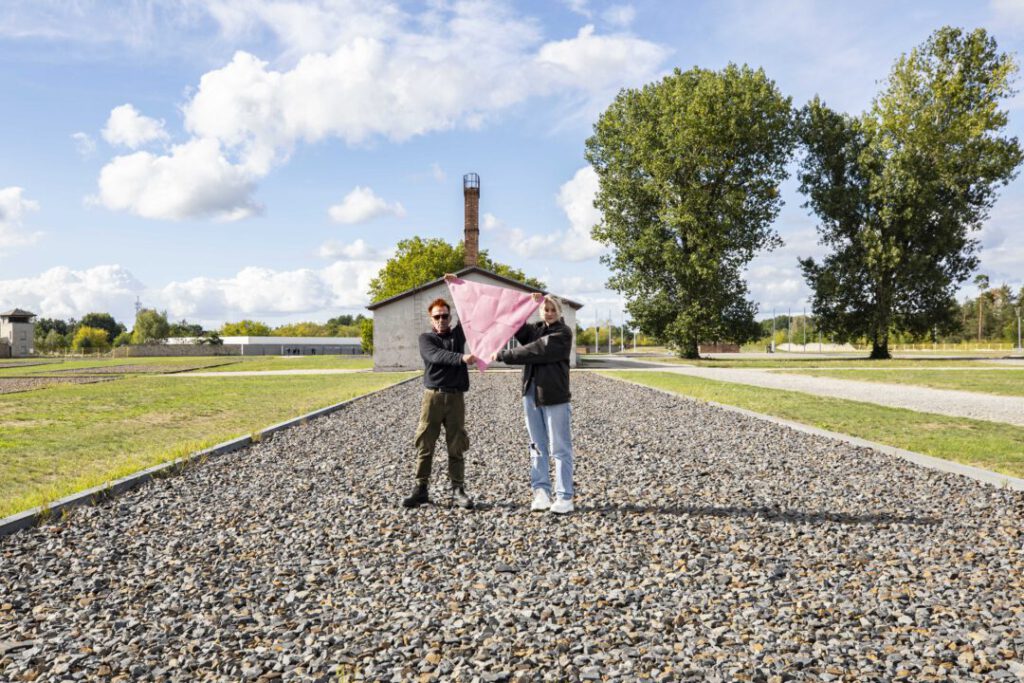
Photo: Ruthe Zuntz
A precursor project?
As a matter of fact, it appears that the project „Voices of the Next Generations“ allows these young Europeans to create a safe space for free expression where they can share a painful story, find support through the recognition of a common experience, and thus free themselves from the family patterns they have inherited.
If this freedom of speech can only be beneficial to them on a personal level, since it allows them to transcend their traumas, it also lays the foundations for a more peaceful collective future in a society where the sacrifice of their grandparents would not be forgotten.
The fact remains though that the development of such an innovative and ambitious project raises several questions: How to share a personal story and place it in a broader perspective? Should we focus on remembrance by questioning the past, or rather prepare for the future by taking a stand in political debates?
So many questions that these young people will have to answer to find their voice(s). Beyond this work of collecting testimonies, the creation of a committee bringing together members of the third and fourth generation as well as the inauguration of a monument to include them officially in remembrance are already being considered.
At the moment, however, this project remains almost unique, since there is only one similar project that has been developed for a few years at the Neuengamme memorial near Hamburg.
Moreover, “Voices of the Next Generations” was born under the impetus of the Sachsenhausen memorial, more than as a reaction to a spontaneous request from the younger generations. To be more specific, it does not yet have a predefined roadmap for its future development, but rather evolves gradually, according to the proposals of the participants. In the long term, its sustainability will also depend on the ability to find stable sources of funding, as it is often the case with this type of project.
So, the launch of the website served as a test, and made it possible to take the temperature as to the interest aroused by the project outside of insider circles. The number of people involved could potentially be enormous, although it is difficult to estimate the exact number of descendants of concentration camp prisoners at the present time.
In a European context marked by the war in Ukraine, the latest developments also tragically echo the approach of the „Voices of the Next Generations“, as the op-ed they recently wrote together to oppose the Russian invasion suggests. In this joint statement, they assert that „we all share a common responsibility to stop the cycle of violence“.
Taking the time to confront the past as these young people invite us to do could perhaps allow us to write another History, in a future where the promise of “Never again!” would no longer remain a dead letter.
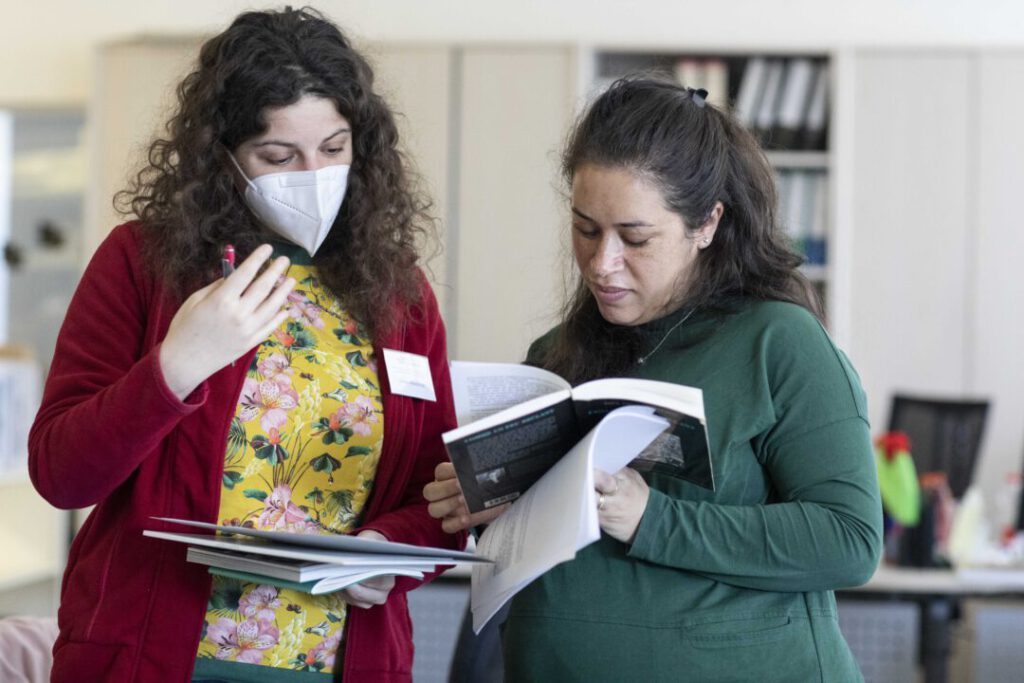
Author
Amélie Reichmuth
